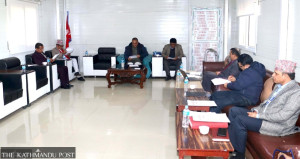Sudurpaschim Province
Dhangadhi is turning trash into cash through innovative waste handling
Through biogas, recycling, and public engagement, the farwest Nepal city is showing how waste can be put to good use.
Arjun Shah
Garbage is a growing problem for most Nepali cities, but in the Dhangadhi Sub-Metropolitan City in Kailali district, it is a growing source of income.
Through systematic waste collection and processing, the city earned Rs2.55 million in the last fiscal year of 2023-24. According to Ashok Awasthi, chief of the Environment, Drinking Water and Sanitation Unit, the sub-metropolis expects to generate Rs7.2 million in the current fiscal year, 2024-25.
Operating under the slogan ‘Hamro Dhangadhi, Safa Dhangadhi’ (Our Dhangadhi, Clean Dhangadhi), the sub-metropolis has banned littering and ramped up community engagement. “We’ve formed sanitation committees from neighborhoods to schools over the past 18 months,” said Awasthi, emphasising that public participation has been crucial to their success.
Residents are noticing the change. “You rarely see litter on the roads these days,” said Pramesh Bhatta of Taranagar in Dhangadhi. “Every week, the municipal truck comes to collect waste from our home.”
According to municipal data, Dhangadhi generates around 56 tons of waste daily. This waste is collected at the source and sorted into biodegradable and non-biodegradable. These are then processed through a micro-segregation centre established alongside a biogas plant at Saraswatitole in ward 2 of Dhangadhi.
Non-biodegradable waste—plastic, iron, rubber, paper and glass—is sorted and stored for resale. “We’ve significantly reduced our waste collection burden through outsourcing. Previously, the municipality handled all 56 tons. Now, our private partner manages 43 tons, and we handle the remaining 13,” said Awasthi.
Last year alone, Dhangadhi spent Rs40 million on staff, vehicles, and other logistics related to waste collection. This year, the expenses have decreased.
But Dhangadhi’s ambition goes beyond collection. The sub-metropolitan city, in partnership with the Alternative Energy Promotion Centre and Dev Training Centre, a vocational training school, is producing compressed natural gas (CNG) from biodegradable waste. “We’re producing enough gas to fill 60 [cooking gas] cylinders per day and about 2.5 tons of compost,” Awasthi confirmed. The biogas plant consumes about 18 tons of biodegradable waste daily, which includes vegetable scraps, leftover food, rotten fruits, cow dung, and poultry waste.
Awasthi attributes Dhangadhi’s success to a four-pillar strategy: strong policy, dedicated budget, robust infrastructure, and public awareness. “These four elements are actively working together, and that’s what has made waste management effective in Dhangadhi,” he said.
The sub-metropolis has also prioritised community involvement and recognition. “Public awareness is our primary strategy,” Awasthi explained. Facilitators have been deployed in each ward, and neighbourhood sanitation committees have been formed. Schools and eco-clubs are also actively involved.
To motivate continued engagement, the city rewards outstanding performers. On its establishment day, the city honoured the Adarsha Tole Sanitation Committee in ward 2 of Dhangadhi with a Rs1 million project. Additionally, Behadababa Secondary School in ward 16 and Rising Star English School in ward 6 were each awarded Rs500,000 in cash for excellence in sanitation.
Mayor Gopal Hamal said the city is moving towards a zero-waste policy through technology-driven waste management. “We’re banning plastic use, installing plastic bottle collection machines, upgrading public toilets, and introducing systems like consumer databases, solid waste management information systems, and faecal sludge regulations,” he said. He also mentioned ongoing efforts to conserve surface water sources.
Furthermore, under the Nepal Government’s Regional Urban Development Programme, an integrated waste management and fecal sludge treatment center is being constructed in Patel area in ward 7.
These efforts have earned Dhangadhi international recognition. The city has been named a founding member of the “Zero Waste Network City” by the Global Alliance for Incinerator Alternatives (GAIA) for its success in managing urban waste sustainably.
“With the right policies and public participation, even garbage can become a resource,” claims Awasthi.




 9.12°C Kathmandu
9.12°C Kathmandu















